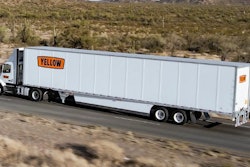
What do drivers want? Find out with this comprehensive research from the editors at CCJ.
Download to access insights on driver pay, why they switch fleets, family life/home time and more.
This is one of three installments in CCJ's What Drivers Want series. Two other articles in the series are "The truck and equipment specs drivers prefer" and "Why many drivers aren't looking forward to retirement". You can download the full results of our What Drivers Want report here.
More pay. More home time. Respect. A clear career path that moves them from the cab and possibly to the office. The answer to what truck drivers want from a potential employer/carrier is "all the above."
Throwing more money at more driver applicants might be the lowest of the low-hanging fruit, but it's not the be-all, end-all when it comes to why a driver would join any given fleet over thousands of others, according to the results of CCJ's most recent What Drivers Want survey, a poll of more than 800 leased owner-operators and company drivers.
Two of the top three concerns among drivers are pay related: paying bills each month (no. 1) and saving for retirement (no. 3). Health was no. 2 among all respondents.
"When you drive a truck, you have a lot of difficulty taking off for doctor visits and revisits, labs and testing," said private fleet driver Tim Ahrens. "We drivers just put off addressing our health concerns until it’s too late to stay healthy."
Leased owner-operators ranked saving for retirement ahead of health by two percentage points, and that retirement savings ranks so high is alarming considering that the average age of our survey respondents was 60 years old (59 years for leased owner operators and 60 for company drivers), and almost 70% have been in the business for more than 20 years.
"Listen to those who came before you," company driver Tim Martin warned for new entrants. "Save your money for early retirement."
If there's good news it's that the thing drivers dislike most about the job (35%) is something fleet employers can do little about: regulations make it harder to work and make a living.
"If they just let me and others work in a manner that is good for us most of us know how far we can go and when to rest," said leased driver Douglas Van Ausdal. "The 70-hour rule in eight days is nuts. Let us have a 14-hour day, 11-hour drive time and do away with this 70-hour stuff, then you don't need a reset. Keep the 30 (minute) break in because big companies will push their drivers, as they do anyway."
Second among the unpopular parts of the job, with 20%, was a lack of respect/appreciation for drivers.
"Trucks are wanted nowhere, but everyone wants what we haul," said leased specialized owner-operator Donna Orlando. "The new driving force is disrespectful to communities. They leave trash everywhere they go. The general public is selfish – me first mentalities – and should be better educated about the larger vehicles they share the road with. Lack of law enforcement in the roads has made it more dangerous out here. Society has lost their selfish minds."
Third on the list of dislikes was a tie (9%) between not making enough money and frustration with new and complex technologies.
Why do fleets have a hard time finding and keeping drivers?
The search for drivers can, at times, feel like an installment of the Indiana Jones franchise, but according to the results of CCJ's most recent What Drivers Want survey, it boils down to just a few factors.
Download CCJ's 2022-2023 What Drivers Want survey results here.
Among company driver respondents, 62% said fleets don't pay enough, and leased owner-operators (59%) agreed that was the biggest reason fleets can't find drivers to hire. Next (55% company drivers, 58% leased owner-operator) was a lack of respect for drivers and the job they do, or failure to treat them as part of the team. Coming in third (52%) among company drivers was home time. Leased owner-operators ranked home time fourth (45%), behind a lack of support for drivers in dealing with shippers, law enforcement, etc. (46%). Company drivers ranked lack of driver support fourth (49%).
When it comes to retaining drivers, pay (64%), again, is the top reason fleets struggle, according to 64% of company driver respondents. Leased drivers, who ranked pay as the top reason fleets can't find drivers, ranked a lack of respect as the top reason (61%) fleets struggle to retain them. The leased owner-op group ranked pay second (57%). Company drivers agreed respect was important, but ranked it the no. 3 reason fleets lose drivers, behind a lack of home time (57%).
"If a company can't retain drivers then it's because drivers are unhappy at the company," said company driver Andrew Callen. "The company should make it a point to figure out why their drivers are unhappy and make changes at the company. Then the company will no longer have an employee retention problem."
Unsurprisingly, both driver groups said being offered more money would be the main reason (35%) they would consider changing jobs and drive for another fleet. Having the flexibility to choose their own routes and hauls tied with being shown the fleet appreciates the work drivers do and having a team atmosphere at 21%. Home time (14%) fell to the no. 4 slot.
Among the things drivers ranked the lowest as a factor when considering joining a fleet are two things most often treated as recruitment carrots: new equipment and sign-on bonuses. In fact, when it comes to making a decision to leave one carrier for another, these two offerings ranked lower than everything else.
Nearly a quarter of all respondents (23%) to CCJ's most recent What Drivers Want survey of company drivers and leased owner-operators said they would raise pay if they were in charge of a fleet and could do one thing to attract and retain drivers. Another 18% said they would guarantee pay, loads or mileage to make take home pay more predictable.
"I would also fight for my drivers in regard to detention and delays at shippers and receivers," said Callen.











